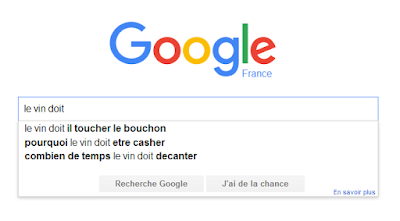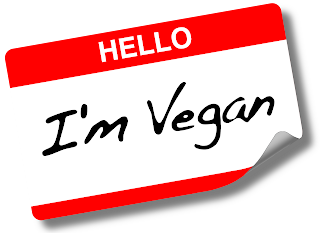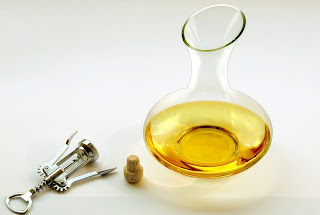What could be better than looking at the questions you most often ask the Google search engine to answer your strongest questions about wine? ?
Today, we will start this series of articles with "the wine must" and here is what we can find as questions :
Should the wine touch the cork ?
We clearly touch on the subject of bottle conservation. I often see people keeping them in their kitchen on the counter, standing and next to the hotplates.
Of course, a bottle that you are sure to open within a week does not necessarily need special storage precautions. Keeping her down or up won't make much difference.
But when you indulge yourself in buying a good bottle that you want to age to enjoy it when it is at its peak, it is necessary to take precautions. In that case, it is vital to store your bottle lying down - i.e. parallel to the ground —.
This lying position of the bottle allows the Cork to be constantly humidified. Thanks to that, the cork will not contract. The cork must be wetted to ensure tightness and prevent excessive exchange with air.
It is therefore essential to systematically keep your wine bottles lying down when the stopper is cork. The standing position is to be avoided except for transport or for a short conservation.
For other wine conservation rules, I invite you to read or reread the article " How to store your wine in good conditions ".
Why does wine have to be kosher ?
Religious reason
It wasn't that long ago that kosher wine was used exclusively for Jewish worship. He is omnipresent in the Jewish tradition, but almost absent from daily consumption habits. We find kosher wine for kiddush - prayer over wine —, le shabbat — from friday to saturday - and many other holidays in the Hebrew calendar such as Rosh Hashanah, Yom Kippur or Pessah.
Wine and other wine-based spirits - like cognac - are pure products and can be consumed. However, the Torah forbids the use and consumption of grape drinks or grape alcohol, and any product from the press that has not been manufactured under the supervision of a competent rabbi, or who would have been manipulated by a non-Jew. However, it should be noted that Leviticus forbids priests to consume wine or other fermented drink when they come to the Tent of Meeting., when they separate the sacred and the profane, the impure and the pure, and when they make known to the Israelites any of the decrees that Yahweh issued through Moses (Lv 10:9). In Ezekiel the priest is asked not to drink wine "on the day when he enters the inner court" (This 44:8). If a non-Jew touches certain pure products, these products become impure and therefore unpalatable.
If you need to remember anything from these previous paragraphs, it is important to offer or offer a kosher wine when one of your guests is of Jewish belief. — You can open the bottle yourself and help yourself, because you don't touch the wine while doing it —
The personal reason
Apart from obvious religious reasons, it may also be interesting to consume kosher wine. We saw it in the article " What is a vegetarian wine ? ", many wines undergo a clarification step called fining. Egg white, fish glue or gelatin are used to make your drink clear.
By inviting a vegan friend to your table, it is important to offer him a wine that respects his eating practices. If you do not find one with the words "vegan friendly", you can without hesitation buy kosher wine that respects the same production conditions. The bio can be non-vegan because organic production does not prohibit the use of egg white - for example —.
How long does the wine have to decant ?
What is decantation ?
For this last question, we touch on a sensitive subject. It is necessary to go back to two concepts that we must know how to distinguish : decant and decant. The subject has already been covered in the article " Should we decant or decant ? ", but we will still do a quick summary here. — I am generous —
Carafer: Decanting serves to oxygenate a young wine to awaken its aromas and harmonize the whole, and the tannins will appear less aggressive. Using a carafe can also be interesting to let any possible disappear reduction odors — odors due to confinement of wine —.
Decant: Decantation removes the deposit present in a bottle before tasting. This deposit is formed especially in old wines, but the settling can rush them, it is therefore necessary to be very careful with the settling. Very tannic wines tolerate being decanted better.
So how long ?
that being said, you will understand that decanting only serves to remove the deposit from a bottle and does not require a particular time - just time to pour very, very, but then very gently the contents of the bottle into the carafe ! —.
The real question is therefore rather "How long should we decant the wine?" ? "
Wine is more akin to alchemy than an exact science, so there is no universal answer to this question.
The important thing is to let the wine rest. Before decanting it, remember to taste a little bit to find out if it is necessary to put it in a carafe and to be able to judge its evolution over time. Generally, 1 to 2 hours is enough in most cases. At the end of this period, taste a little to see its evolution. More dense or very young wines can undergo a decanting of 3 or 4 hours and very massive New World wines may require 6 to 8 ventilation hours.
You can also be patient by uncorking your bottle of wine at least 6 hours before serving - or if you don't have a carafe —. By leaving your bottle uncorked, the wine will gain in finesse. Thanks to a ventilation surface limited to the neck, slow oxygenation will be beneficial to the wine.
Do not hesitate to let me know your impressions of your experience in the comments. You can also follow your wine blog with Instagram.







